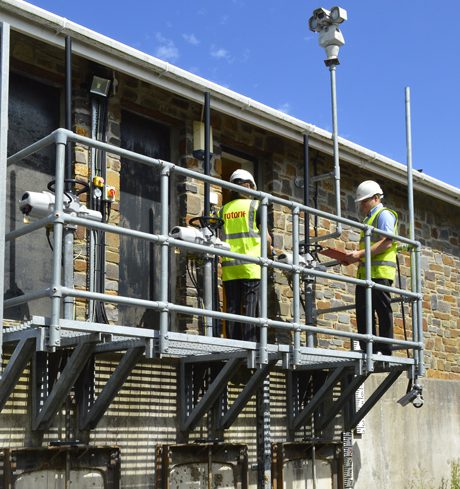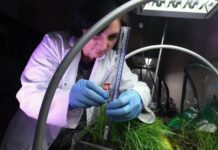
An extended scope contract performed by Rotork Site Services has successfully delivered full automation of a flood alleviation scheme protecting the historic town of Cardigan in West Wales. The project involved replacing unreliable actuators from another manufacturer, installing a PLC control cabinet and interfacing with the existing river level sensor and telemetry system.
The flood alleviation scheme on the River Mwldan was constructed 20 years ago by the local authority. It consists of a V notch weir, an over-spill grid into a culvert that travels approximately half a mile through the hillside into the estuary and three flushing penstocks. In 2006 the scheme was adopted by Natural Resources Wales (NRW – formally Environmental Agency Wales). Since then, NRW has installed CCTV and telemetry to enable remote visual monitoring of the site from central control rooms and mobile devices.
Old actuators risk
During recent periods of intense rainfall the weir has been at the point of over-topping and, to reduce the flood risk, two of the penstocks were opened. As well as proving the vital importance of the penstocks, these events also highlighted the unreliability of the electric actuators originally installed. Poor environmental sealing had enabled moisture to enter electrical enclosures, causing operational failures. As a result, NRW decided to replace the actuators and at the same time introduce full automation of the flood alleviation scheme.
The work carried out
The extended scope contract awarded to Rotork Site Services encompassed all aspects of the task, enabling Rotork to organise the total supply of the work together with project management services. Rotork’s responsibilities included an initial survey, removal of the old actuators and replacement with new, installation of a PLC control cabinet with HMI for local control and indication, interfacing with the level sensor and telemetry system and commissioning of the completed installation. The new Rotork IQ12 intelligent electric actuators installed are controlled by the PLC, using the signal from the river level sensor and operating in 5% travel increments.
Operation of the site is now fully automated and remotely monitored. If necessary, the automatic system can be overridden and the actuators can be operated remotely via the telemetry system or locally via the HMI panel on the PLC control cabinet.
Mike Haley is the NRW MEICA electrical engineer who has been responsible for automation upgrade project. He comments: “The scheme using Rotork actuators has successfully introduced the level of automation and remote monitoring that we required and restored reliability to the operation of the three penstocks. Rotork actuators have a proven record of reliability at other NRW sites, including an installation which has been operating in an exposed coastal environment for 30 years.”







